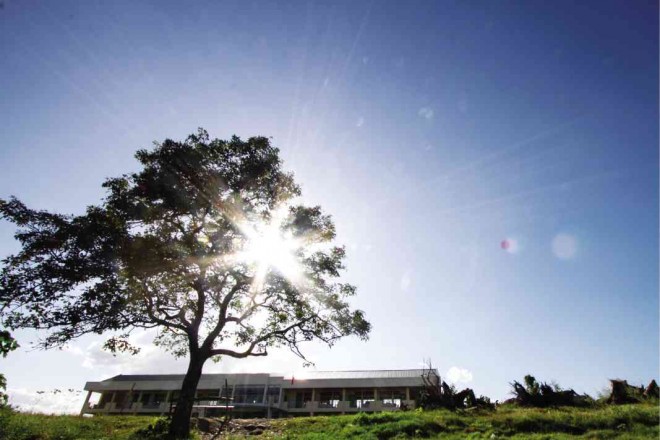The man behind school on a hill in Tarlac

VIEW of the school’s second floor structure from the foot of the hill where it stands today. The school was built largely through the efforts of the late businessman Henry Cojuangco, younger brother of former ambassador Eduardo “Danding” Cojuangco Jr. MAAN SANTOS/CONTRIBUTOR
Chinese philosopher and poet Lao Tzu once said: “A leader is best when people barely know he exists, when his work is done, his aim fulfilled, they will say: We did it ourselves.”
Sadly, this kind of leader is uncommon among public officials. Politicians often blow their horns just to make sure they win another election—except for a few, good men and women who chose to quietly make a difference, like the late Enrique “Henry” Cojuangco.
Known to many as the younger brother of tycoon Eduardo “Danding” Cojuangco Jr.—Sir Henry (as I have learned to address him)—made history in our small town of Mayantoc, where he helped establish a school. It was not just any school, but a technical vocational national high school that took decades to be realized.
One of the four western towns in Tarlac, Mayantoc was once dubbed the “summer capital of the province” because of its relatively cool climate and large pine trees that used to line the road. The people, mostly farmers, are warm, simple and hardworking.
While candidates of the Nationalist People’s Coalition (NPC) were campaigning in 2010, I heard Sir Henry explain to one of our local political allies that skilled Filipino workers were in demand everywhere because of their unique qualities to be flexible and to learn fast. “What’s wrong with our country is not that we, Filipinos, are overly educated but that we are not receiving the right kind of education that will help our country move forward,” he said.
Article continues after this advertisementBarely a month after we both won that election, I asked Sir Henry if he would be interested in supporting the establishment of a national technical vocational high school in our town. In a matter-of-fact tone, he said, “Danding has been supportive of technical vocational education. Prepare the required documents and send them to my office.”
Article continues after this advertisementSir Henry would go in regular sorties to our barangays and see the poverty that had long crippled the majority of the families, whose only economic means was farming. The local Department of Social Welfare and Development also listed 600 out-of-school youths in 2010 and family beneficiaries in the Pantawid Pamilyang Pilipino Program reached 1,577 in December 2014.
With a total population of only 29,987, the school project’s impact on Sir Henry’s political career did not go unnoticed. During the Senate deliberation of his measure, Republic Act No. 10268, a colleague observed, “I don’t understand why he has prioritized this project, given the fact that your town’s voting population is tiny compared to other towns in Tarlac.”
Unlike most politicians, he was the kind of leader who felt deeply for his constituents. When something was needed in the community, he did not hesitate to act, no matter what the circumstances were.
On Nov. 15, 2012, Republic Act No. 10268, which established the national technical vocational high school in Mayantoc was finally signed into law by President Aquino. It was initially filed as House Bill No. 3733 on Nov. 29, 2011, which Sir Henry also authored.
Mayantoc Central Elementary School formally opened the doors of its two rooms to a pioneering batch of 55 students and one faculty member in June 2013. According to the principal, Nelia Andres, the initial courses offered were exploratory subjects in home economics and in industrial arts.
Two years later, due to the relentless efforts of Sir Henry, Philippine Amusement and Gaming Corp. donated a two-story and 10-classroom building on a hill at the school site. The building was inaugurated and blessed on June 2, but the guest of honor, Sir Henry, did not make it due to his sudden death on May 12.
Now on its third year of operations, the school (renamed Josephine M. Cojuangco National Technical Vocational High School after Sir Henry’s mother by virtue of Sangguniang Bayan Resolution No. 16-2013) has a quadrupled population of 250s.
With the coming 2016 national and local elections, I fervently wish and pray that there will be other political leaders in our district and in other parts of the country who would emulate Sir Henry’s example of sincerely caring for the welfare of their constituents and not merely calculating the numbers they bring to the polls.
In his almost six years of service as our district representative and as one of NPC’s most esteemed leaders, Sir Henry did not fail to act on his commitments in terms of community development. Given the bulk of his accomplishments, his foremost legacy remains to be the gift of hope to our town’s youth and their families.
(Editor’s note: Marian or Maan Santos is a former senior Sangguniang Bayan member of Mayantoc, Tarlac, and once chaired the committee on education and culture.)